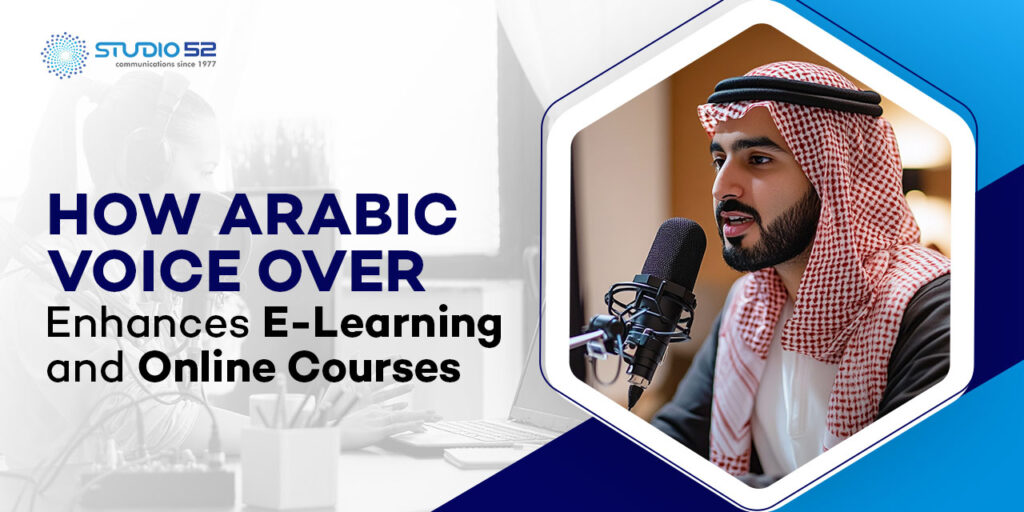E-learning has become a core method of education delivery across the Arab world. From professional development programs to academic courses and government initiatives, digital learning platforms are being adopted at an increasing pace. Having said that, the effectiveness of these platforms hinges on how well they communicate with their target audience, something that is often compromised when the content is solely in English. This is where the importance of language localisation through Arabic voice-over for e-learning comes into focus.
In Arabic-speaking regions, language is not a medium of communication, it carries cultural context, comfort, and familiarity. Incorporating Arabic voice over for e-learning ensures that learners understand the content and engage with it meaningfully. This blog explores how Arabic voice over solutions are reshaping online education, detailing their impact across various sectors, best practices for implementation, and the long-term benefits for educational institutions and businesses.
Table of Content
The Role of Arabic Voice Over in E-Learning
- Enhancing Comprehension for Native Arabic-Speakers
A significant portion of learners in the MENA region are native Arabic speakers. When educational material is presented in their first language, comprehension increases significantly. Using Arabic voice over for e-learning, institutions ensure that learners do not struggle with language barriers and can instead focus on grasping the core subject matter. Native language instruction leads to clearer understanding and better application of knowledge.
- Making Learning More Engaging and Interactive
Voice adds human warmth and tone to digital content.A well-executed Arabic voice over service transforms static, text-heavy modules into dynamic, engaging learning experiences. When learners hear instructions, explanations, or examples delivered in their own language with appropriate tone and emphasis, it simulates a more classroom-like environment, promoting deeper concentration and attentiveness.
- Improving Accessibility for Diverse Learners
Not all learners in the Arab world have a strong command of English. Many are more comfortable absorbing knowledge in Arabic. The use of Arabic voice over for online courses makes e-learning more accessible to individuals from different educational backgrounds, age groups, and regions. This inclusivity ensures that learning opportunities are not limited by linguistic limitations.
Benefits of Arabic Voice Over for Online Courses
- Better Knowledge Retention and Learner Engagement
Scientific studies consistently show that people remember audio content better when delivered in their native language. By incorporating Arabic voice over for e-learning, educators can ensure that learners retain more information and stay engaged throughout the course. This is particularly effective for complex subjects where conceptual understanding is essential. - Increased Inclusivity and Accessibility for Non-English Speakers
Incorporating Arabic voice over in Dubai or similar regional localisation allows non-English speaking learners to participate equally in digital learning environments. Whether it’s a compliance training program for factory workers or a technical course for remote learners, audio content in Arabic ensures equitable access. - Cultural Relevance and Localisation for a Better Learning Experience
Language is deeply intertwined with culture. Using a professional Arabic voice-over artist in Dubai ensures that the narration aligns with the cultural expectations of the target audience. Phrases, idioms, and tone choices can make the content more relatable and respectful, enhancing the overall learner experience. This attention to detail builds trust and creates a stronger connection between the platform and its users.
Industries Benefiting from Arabic E-Learning Voice Overs
- Corporate Training and Professional Development
Businesses across the Middle East are investing in e-learning for employee development. These programs often cover safety training, compliance, and technical skills, and onboarding. Using Arabic voice over in UAE for these courses ensures that all employees, regardless of their language proficiency, understand the material and complete training successfully. It reduces errors, improves safety, and increases productivity across the board.
- Academic Institutions and Online Education Platforms
Universities, schools, and online course providers are increasingly turning to Arabic voice over for online courses to reach a broader student base. Whether it’s MOOCs, digital textbooks, or virtual classrooms, localised voice overs provide an engaging and understandable format that enhances the learning journey. - Government and Nonprofit Educational Initiatives
Government bodies and nonprofit organisations often run literacy programs, civic education, and skill-building initiatives for underserved populations. Employing Arabic voice over artists ensures that these programs are accessible and effective. Clear and professional narration helps bridge the gap for learners with limited formal education.
Best Practices for Arabic Voice Over in E-Learning
- Choosing the Right Professional Arabic Voice Over Artist
Not every voice fits every course. Selecting a qualified Arabic voice over artist is essential. The artist should have prior experience in educational narration, a neutral accent for broader understanding, and the ability to convey educational content with clarity and authority. Gender, tone, and age of the voice must match the course context to maintain learner attention. - Ensuring Clarity, Tone, and Pronunciation Consistency
Consistency in voice tone and pronunciation is crucial across modules, especially in long-term training or multi-part courses. Hiring a reputable Arabic voice over company ensures that production teams maintain these parameters and conduct rigorous quality checks. This avoids learner confusion and maintains instructional integrity. - Using High-Quality Audio Production for Better Learner Experience
Audio quality can significantly impact the learner’s focus. Background noise, inconsistent volume levels, and poor editing can break immersion and reduce effectiveness. Professional Arabic voice over service providers use studio-grade equipment and experienced audio engineers to produce clean, crisp, and intelligible narration. Investing in production quality is essential to uphold credibility.
Why Should Businesses Invest in Arabic Voice Over for E-Learning
- Expanding Reach to Arabic-Speaking Learners
Arabic is one of the most widely spoken languages globally, with a significant presence across the Middle East, North Africa, and parts of Asia. By incorporating Arabic voice over for e-learning, businesses and educators can expand their services to a vast and untapped market. This strategic investment allows platforms to cater to a population that is actively seeking quality educational resources.
- Strengthening Brand Credibility and Trust
Organisations that invest in localisation, including Arabic voice over in Dubai, are perceived as more trustworthy and professional. Learners are more likely to associate well-delivered content in their native language with reliability. This, in turn, increases course completion rates and positive word-of-mouth referrals.
- Gaining a Competitive Edge in the E-Learning Market
The e-learning landscape is highly competitive. Offering a high-quality Arabic voice over service gives businesses an edge by catering to regional needs. Courses that are linguistically and culturally aligned stand out in the marketplace and often perform better in terms of engagement, completion, and learner satisfaction.
Partnering with the Right Provider Makes the Difference
If you’re aiming to deliver an impactful learning experience to Arabic-speaking audiences, selecting the right voice over partner is critical. Studio52 offers a specialised Arabic voice over service designed specifically for educational, corporate, and institutional content. With over four decades of experience in voice production, Studio52 brings both technical capability and cultural insight to every project. The team works with a broad network of skilled Arabic voice over artists, ensuring that narration matches the tone, pace, and clarity required for effective knowledge delivery.
Whether you’re producing compliance training, onboarding content, academic courses, or community outreach programs, their solutions are built to support high engagement and learner retention. For organisations seeking Arabic voice over in Dubai and Arabic voice over in UAE, their regional expertise ensures that your content aligns with local dialects, cultural sensitivities, and learner expectations. By partnering with Studio52, you gain access to a team that understands the nuances of e-learning and deliver audio solutions that support your instructional goals at scale.
Conclusion
The demand for e-learning in the Arab world continues to grow, fueled by advancements in technology and an increasing need for accessible education. Incorporating Arabic voice over for e-learning is not merely an enhancement, it is a necessity for those looking to effectively reach and teach Arabic-speaking learners.
Whether it’s through corporate training, academic courses, or government-led initiatives, Arabic voice-over for online courses ensures that educational content is clear, culturally appropriate, and inclusive. Businesses and educators that invest in professional Arabic voice over artists, high-quality Arabic voice over service, and experienced Arabic voice over company professionals are better positioned to serve this growing market.
By taking these steps, stakeholders not only improve learning outcomes but also strengthen their brand presence in Arabic-speaking regions. Now is the time to prioritise voice-over localisation and provide learners with the clarity and connection they deserve.


